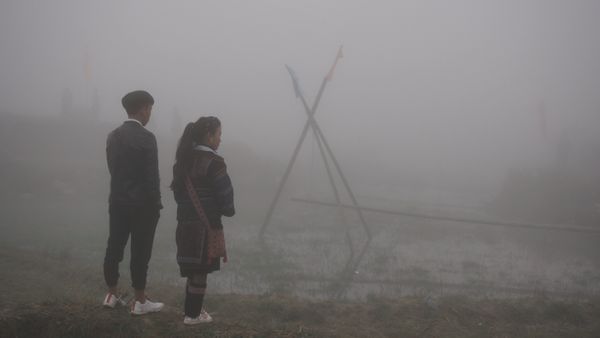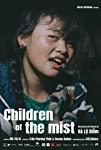Eye For Film >> Movies >> Children Of The Mist (2021) Film Review
Children Of The Mist
Reviewed by: Andrew Robertson

A long form documentary shot over the course of several years in the hill valleys of Vietnam, Children of the Mist asks several uncomfortable questions of its audience and, indeed, its documentarian. Di is a young Hmong girl, a friend of director Ha Le Diem, and every scene is coloured as much by the eponymous fog as by a statement. "Always scared of what would eventually happen".
Near the start we climb a feature of the landscape that we will return to, in different contexts, days, weeks, months, years later. "This is the biggest rock around", and the different perspective it offers is one of several within the film. There is a tradition among the Hmong of bridal kidnap. As Di gets older, as her schooling continues, the day that something will happen gets closer.
Until it does, there is unease, and when it does, which almost goes without saying, the unease grows. I have been discomfited watching films before but the anguish here is so genuinely and affectingly captured that it is almost unbearable. Di's of course, indeed I will recall Di screaming for Diem's help for some time yet. Yet also Diem's, her attempts to navigate this all, given at once the remove of the camera but no less in and among it.
The intimacy makes it all the more affecting. We spend much of the film at arm's length, not at one remove but close enough to touch. We have juxtapositions of selfie sticks and hungry pigs. The processing of indigo dyes everything around it but no colour cuts as quick as dread. Knowing that it is coming will not prepare you for hearing two words, "Help me".
These are landscapes full of steep drops. The complexities of geography physical, the terraces, the mud, the rocks, the mist, the fog, the wind, and then geography political. References to Catholics and Prodestants make odd bedfellows with the presence of People's Committees, there are points where declarations seem as much of the teenage diary as of the confessional as of the struggle session. The consequences are significant and so is the language, the C-word is one of several swear words deployed in subtitle.
Swann Dubus, another director, performs editing duties. No small feat in a film that, much like Boyhood or Moonlight, follows someone across and through a transitional stage, but without the benefit of script. History is longer than story, and it is not solely because there's a bit more at the start. In conversation with Eye For Film Diem talked about the process of filming, gives some measure of the chronology. There's more to it than time, however, of eras ending, clashing, the passage of the inescapable.
There is a lot of uncomfortable viewing here. The impacts of alcohol on indigenous communities are well documented, and among them here is seasonality, the quotidian. A chicken is slaughtered on screen but the negotiations around bride prices and "break-up wine" feel more visceral.
To what extent are we compromised by observing tradition? That's the question I came away with, and I don't have answers. I can't even say what forms of observation I am limiting it to. Nor does Diem's film answer them, nor should it. "time will decide" is just one of many things said in the film that reflect it. When someone says an outcome is "everything she deserves" there's so much weight to it that the harrowing business of negotiations, the heartbreaking enquiry of "I guess I did something wrong", "you're in it now", all builds, consumes. The mist rolls up and out of the valley and everything is, once more, hidden.
Reviewed on: 23 Aug 2022















